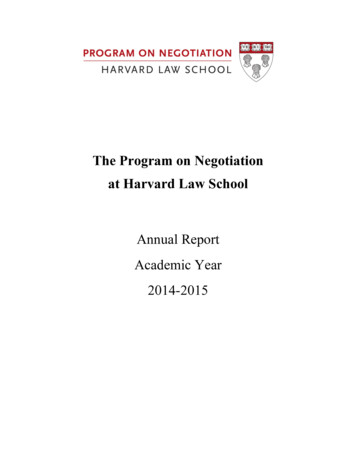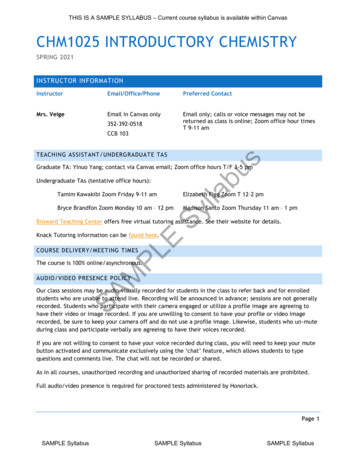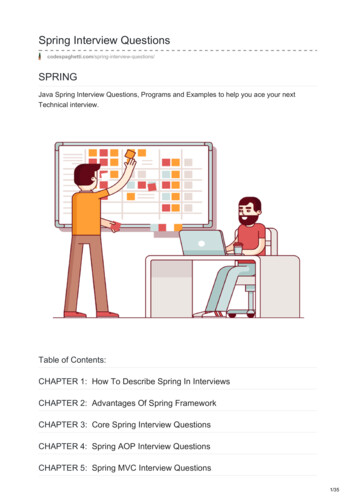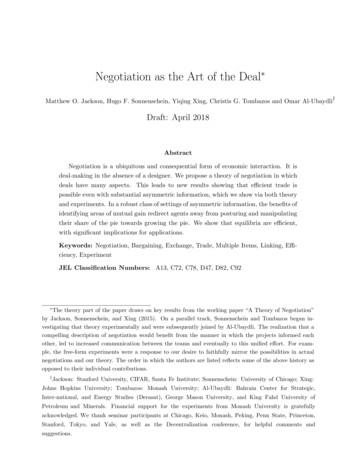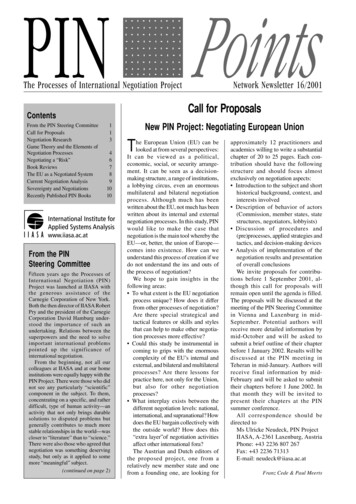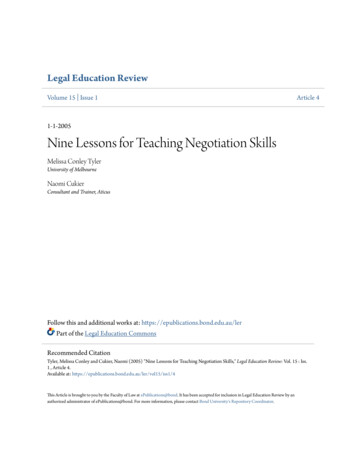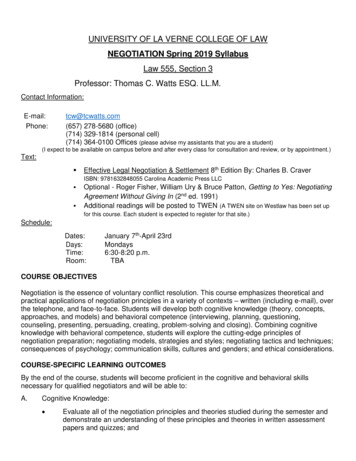
Transcription
UNIVERSITY OF LA VERNE COLLEGE OF LAWNEGOTIATION Spring 2019 SyllabusLaw 555, Section 3Professor: Thomas C. Watts ESQ. LL.M.Contact Information:E-mail:Phone:tcw@tcwatts.com(657) 278-5680 (office)(714) 329-1814 (personal cell)(714) 364-0100 Offices (please advise my assistants that you are a student)(I expect to be available on campus before and after every class for consultation and review, or by appointment.)Text: Effective Legal Negotiation & Settlement 8th Edition By: Charles B. CraverISBN: 9781632848055 Carolina Academic Press LLC Optional - Roger Fisher, William Ury & Bruce Patton, Getting to Yes: NegotiatingAgreement Without Giving In (2nd ed. 1991)Additional readings will be posted to TWEN (A TWEN site on Westlaw has been set upfor this course. Each student is expected to register for that site.)Schedule:Dates:Days:Time:Room:January 7th-April 23rdMondays6:30-8:20 p.m.TBACOURSE OBJECTIVESNegotiation is the essence of voluntary conflict resolution. This course emphasizes theoretical andpractical applications of negotiation principles in a variety of contexts – written (including e-mail), overthe telephone, and face-to-face. Students will develop both cognitive knowledge (theory, concepts,approaches, and models) and behavioral competence (interviewing, planning, questioning,counseling, presenting, persuading, creating, problem-solving and closing). Combining cognitiveknowledge with behavioral competence, students will explore the cutting-edge principles ofnegotiation preparation; negotiating models, strategies and styles; negotiating tactics and techniques;consequences of psychology; communication skills, cultures and genders; and ethical considerations.COURSE-SPECIFIC LEARNING OUTCOMESBy the end of the course, students will become proficient in the cognitive and behavioral skillsnecessary for qualified negotiators and will be able to:A.Cognitive Knowledge: Evaluate all of the negotiation principles and theories studied during the semester anddemonstrate an understanding of these principles and theories in written assessmentpapers and quizzes; and
B.Understand the critical importance of negotiation preparation by preparing negotiationpreparation outlines.Behavioral Competence: Engage in negotiation objectively and strategically, acknowledging rather thanemphasizing emotions;Evaluate and relate to interpersonal communication styles and negotiation theories andstrategies while communicating as part of a negotiation;Engage in ethical negotiation; andDemonstrate an understanding of civility and professionalism.COURSE-SPECIFIC POLICIESA.Teaching MethodologyThe field of alternative dispute resolution does not necessarily involve concrete principles thatneed or must be applied in every situation. Negotiation participants will benefit from their abilityto be flexible. The professor’s role is to open students’ minds, pose questions, but notnecessarily provide concrete answers regarding every topic discussed in class. Many of theclass discussions will go beyond the scope of the assigned readings. Students shouldapproach the readings by examining the material and then contemplating how it plays a part ofa larger picture.During class sessions, students will be expected to participate in class discussions abouttheoretical topics. Much of the course will be devoted to role-playing in fictitious fact scenariosso that students may gain the practical skills of negotiators. Although this course does notfocus on case briefing, some cases may be assigned. Students will be expected to read, briefand be prepared to discuss the legal implications of the cases in a modified Socratic dialogue.As part of the Transactional Track, this course culminates in the negotiation of a final salescontract. For this project, students will rely on all information presented during the semester toprepare for the negotiation, and draft a written negotiation preparation plan that memorializestheir preparation. They will then engage in a three-hour negotiation session. The negotiationswill be videotaped so that students may use the videotapes to recall specific instances of thenegotiation as they draft a final assessment paper that will be due at the beginning of the finalclass session. The final assessment paper will take the place of a final exam for this course.The negotiation will culminate in the execution of a sales contract.B.Classroom ExpectationsStudents are expected to attend every class and be prepared. That means students shouldread all assigned material and be prepared to discuss the concepts in class. Some groupprojects will be assigned and students will be expected to contribute their assigned task(s) tothe group project.Class participation is a key component of this course. Students are expected to be on time foreach class. This is a simple courtesy to your fellow classmates and your professor. Punctualitywill enable you to benefit by participating fully in the class discussions. Normally, the professorsets forth consequences in the syllabus for tardiness. Students will negotiate consequencesduring the first class meeting.This course is higlhly dependent on good communication skills, both verbal and nonverbal.The use of laptop computers during class affects communication; therefore, laptop computers
may not be used during class. In addition, all cell phones, pagers, and any other technologicaldevices should be turned off to avoid any distractions.If you will be unable to attend a class session, please notify the professor in advance asany person’s absence will impact the skills-building exercise planned for that particularclass.Excessive absences from class will result in an involuntary withdrawal from the coursepursuant to College of Law policies.C.Taping ClassesYou may not tape record classes unless exigent circumstances exist, and you receivepermission before each class.EVALUATION AND GRADINGYou will receive a numeric grade in accordance with the College of Law policies.Note: All assigned papers and homework should be typewritten and include a separate coverpage that includes your Student Assignment Number and the name of the assignment. Do notinclude any identifying marks on any other pages.The written assignments should not be written as question and answer exercises. They areassignments to challenge your ability to critically analyze a situation based on class readingsand discussion. Each assignment should have an overall theme, be well organized, wellwritten, and grammatically correct.The College of Law’s plagiarism policy will be strictly enforced in this class. If a studentcommits plagiarism, he or she will be subject to sanctions pursuant to the Student ConductCode at Part IV of the MAPP. For your information, Part IV.B.1.f. states that students areprohibited from “knowingly, recklessly, or negligently” engaging in:“f. Plagiarizing by submitting the work of another as one’s own, submitting workprepared in collaboration with another without express permission, or failing to properly provideattribution of source materials. Plagiarism additionally includes (1) copying the language,structure, ideas, or thoughts of another and representing the same as one’s own original work,unless otherwise permitted by the policies of the course; (2) submitting a purchased researchpaper; (3) submitting another’s research paper; (4) copying material and presenting it as one’sown; (5) submitting one’s own prior work without attribution; (6) submitting a canned brief; and7) paraphrasing and/or quoting material in a paper without proper documentation.”Failure to adhere to any of the components of the following grading requirements will resultin an incomplete grade for the course. Additionally, the Professor reserves the right to deductpoints for any assignment that is turned in late.The final course grade will be separate and apart from the other classes involved in theTransactional Track (Business Organizations, Sales, and the Transactional Track Workshop) andwill be based on the following:1.Final Negotiation Simulation and subsequent Analysis Paper including a NegotiationPreparation Plan in lieu of a final exam, – 55%
2.Two Personal Application Papers to be assigned throughout the semester based on specificrole-play scenarios – 8%The purpose of the paper is to encourage a reflection and analysis process on the “learning byexperience” simulations; the paper also gives the Professor a sense of your individualprogress, and your strengths and weaknesses as a negotiator. Your task in each paper is todescribe your reactions, perceptions, impressions or significant insights gained fromparticipation in or reflection on the simulation. You may talk about the process, yourself, or thebehavior of other people, and may address some or all of the following points:a.Briefly, what happened in the simulation or role-play. In other words, provide a briefoverview of the key events.b.What did you learn about yourself from this experience?c.What did you learn about the behavior of others from this experience?d.What did you learn from bargaining or conflict from this situation?e.How do the concepts in lectures or readings enrich your understanding of the process ofnegotiation, its outcome or your own negotiation style? When referring to specificconcepts, be sure to define them to demonstrate your understanding of the conceptsbefore applying them to facts.f.What would you do the same or do differently in the future, or how would you like tobehave in order to perform more effectively.Each paper will be read, commented on, graded, and returned to you. You will participate in apeer review of another student’s paper. The purpose of the grades is to encourage thoughtfulanalysis and understanding of the simulations, and to encourage use of theory and researchpresented in readings, and lectures. A good short paper is one that tries to step back from thereadings or lecture material to help structure the analysis, and is well written. All of theseguidelines are just that—guidelines.Papers should be no longer than two typed, double-spaced pages.3.4.Two Negotiation Preparation Plans – 9 %.Two midterms to be assigned-20%5.Class Participation/contribution (includes participation in theoretical discussions andparticipation in role plays) – 8%6.7.The professor reserves an option to change the evaluation criterion for this classAdditionally, this class will work hand in hand with Professor Cripe’s afternoonnegotiation class for exercises and practice negotiations. Students are expected tomake every effort to become familiar with students from that class and to make time tomeet outside of classroom time for exercise purposes.DISABILITY ACCOMMODATIONS STATEMENTStudents with disabilities should refer to the policies described at the University of La Verne DisabledStudent Services Handbook [as of September 13, 2017 located at /disabled-student-services-handbook/], which can be found on the website of theUniversity of La Verne Disabled Student Services website s/disabled-student-services-handbook/) or at their office. Temporary accommodations areoffered on a case by case basis. All required documentation must be submitted by the student beforeany formal accommodations and should be made directly to the Director of Student Affairs.
Any student eligible for and requesting academic accommodations due to a documented disability (ora suspected disability) is asked to contact the College of Law Director of Student Affairs andAmericans with Disability Act Compliance Officer, or you can contact the University of La VerneDisabled Student Services office; both listed below. In order to be considered for accommodations,disabilities must be documented and the proper medical evaluations must be submitted. The office ishere to help you succeed in law school. Visit it online at /.College of LawStudent Affairs and American with Disability OfficerAkita Mungaray, Interim Director of Student Servicesamungaray@laverne.edu(909) 460-2017University of La VerneDisabled Student ServicesCindy Denne, Director of Disabled Student Servicescdenne@laverne.edu(909) 448-44412215 E Street, La Verne, California 91750.ABA STANDARD 310This course is designed to satisfy the requirements of ABA Standard 310. Standard 310 requires thatfor each hour of in-class time, students spend two hours preparing for class (reading or completingclass assignments or assessments).Schedule and Text AssignmentsThe course schedule is set forth below. All assigned readings are to be completed before the class towhich they are assigned. The professor reserves the right to modify the schedule to accommodateclass needs. If you are absent, you should verify the assignment for the following week. In addition,any modifications will be posted to TWEN. You are expected to check the TWEN site weekly, and areassumed to have read any posted notice.COURSE SCHEDULEThe course schedule is set forth below. All assigned readings should be completed beforeattending the class to which they are assigned. The professor reserves the right to modify theschedule to accommodate class needs. If you are absent, you should verify the assignment for thefollowing week. In addition, any modifications will be posted to TWEN. You are expected to check theTWEN site weekly, and are assumed to have read any posted notice.WEEKTOPICREADING ASSIGNMENT1Jan. 7Course Introduction;Basic Factors AffectingNegotiationCh. 1 & 2, Effective LegalNegotiation and Settlement(hereafter “ELNS”)2Jan. 14Verbal and NonverbalCommunicationCh. 3, ELNS
3Jan. 214Jan. 28Preparing to Negotiate &The Preliminary StageCh. 4 & 5, ELNSThe Information Stage (ValueCreation) & The CompetitiveStage (Value Claiming)Ch. 6 & 7, ELNS1st Negotiation PreparationPlan DueWEEKTOPIC5Feb. 4The Closing StageCh. 8, ELNSSupplemental Course Materials1st Personal ApplicationPaper Due6Feb. 11The Cooperative/IntegrativeStage (Value Maximizing)Ch. 9, ELNSGetting to Yes, pp. 1-1877Feb. 19NegotiatingGames/TechniquesPsychological EntrapmentCh. 10, ELNSPost NegotiationAssessmentNegotiation EthicsCh. 11, ELNSCh. 17, ELNS2nd Prep Plan Personal &Application Paper Due Feb.28 by 9:00 a.m.9Mar. 11Frequently RaisedNegotiation Issues.Ch. 12, ELNS10Mar. 18The Impact of Ethnicity andGenderCh. 14, ELNS11Mar. 25Practice Negotiating.No Reading Assignment8Feb. 25READING ASSIGNMENTCh. 13, ELNSSpring BreakMar. 7 (No Class)WEEKTOPICREADING ASSIGNMENT
12April 1NO CLASS13Apr. 7Transnational NegotiationsCh. 15, ELNS14Apr. 16Final Negotiation Simulationsto be scheduled throughoutthe week or during previousweekNo Reading AssignmentFinal Project NegotiationPreparation Plan Due Prior toSimulationFinal Review of semester.Final Analysis Paper Due15Apr. 22 Make-up14Apr. 29DisclaimerThe professor reserves the right to make correction, changes, and other alterations to the syllabus, courserequirements, and other elements contained herein. Such changes will be communicated to the students eitherin a regular class session or other appropriate means (e.g., email). All matters pertaining to student rights andresponsibilities as outlined in the ULV catalog are adopted herein.
negotiation as they draft a final assessment paper that will be due at the beginning of the final class session. The final assessment paper will take the place of a final exam for this course. The negotiation will culminate in the execution of a sales contract. B. Classroom Expectations Students are expected to attend every class and be prepared.

